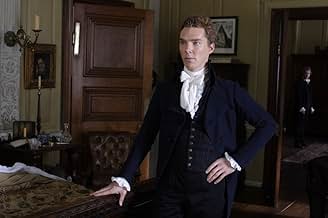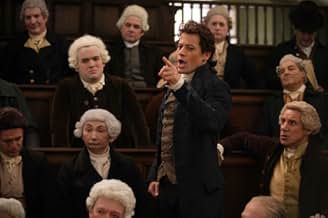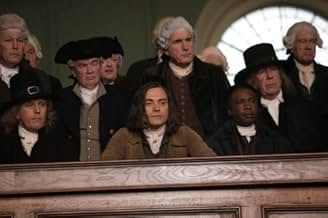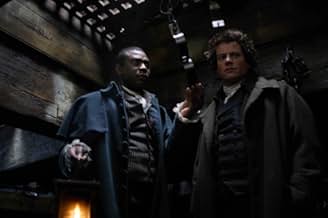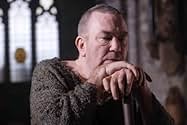PUNTUACIÓN EN IMDb
7,4/10
26 mil
TU PUNTUACIÓN
El idealista William Wilberforce se abre paso en el Parlamento y se esfuerza por acabar con la trata transatlántica de esclavos británicos.El idealista William Wilberforce se abre paso en el Parlamento y se esfuerza por acabar con la trata transatlántica de esclavos británicos.El idealista William Wilberforce se abre paso en el Parlamento y se esfuerza por acabar con la trata transatlántica de esclavos británicos.
- Premios
- 3 premios y 6 nominaciones en total
Ciarán Hinds
- Lord Tarleton
- (as Ciaran Hinds)
Reseñas destacadas
I had the pleasure this past week of seeing a pre-screening outside of Washington, D.C. of the movie Amazing Grace, starring Reed Richards...err...Ioan Gruffudd as William Wilberforce the famous British Christian politician that helped end the slave trade in Great Britain in the early 18th Century. The movie progresses through Wilberforce's life from about the time he begins his crusade against the slave trade in Parliament in his early 20's to the time it is eventually abolished. Everything in between is composed of all the hardships, victories, and relationships he goes through in the meantime. At some points the story can be a bit yawn inducing, but the film consistently seems to add just the right amount of humor or political intrigue to keep it afloat (more on the pacing below). There is a love interest Barbara, played by the quite attractive and dynamic Romola Garai, who keeps Mr. Fantastic...err...Wilberforce on track and encouraged. You get the feeling he would've never made it through the hard times without her (which is probably the case for most successful men as they say). The film does delve into evils of the slave trade, but it doesn't focus specifically on it, much like Amistad did focus on it. It seems to keep the main goal in mind, abolishing that heinous evil. This gives the film a "glass half full" feeling instead of a "glass half empty" one. You find yourself cheering for the good guys instead of seeking the heads of the bad ones.
You may be thinking they should've just called this film "Amistad: The Prequel", but that would do it a great disservice. Where Amistad succeeded in many ways such as exposing the horror of the slave trade in much more visual and visceral detail and containing great acting by Djimon Hounsou and Anthony Hopkins, I feel you ultimately left the theater not really feeling much better about anything. In fact, I'd say you may have left if feeling worse, maybe even shameful and/or guilty. Amazing Grace doesn't feel like that. In fact, it's not even really a "feel good" movie; it transcends that status. It's really a "do good" movie. You almost feel personal empowerment from the story, like you want to go out and change some social injustice yourself! Sure, we don't all have the political clout of a William Wilberforce, but we do have a voice. And I think that's why Amazing Grace stands above previous "social injustice" films like it. It feels organic instead of static. It feels like it could apply to today instead of some time long forgotten. It also appeals to everyone; black, white, or whoever. One African-American in the audience mentioned how he was impressed and encouraged at how passionate these white men were for the plight of the slaves. You also realize that slavery wasn't just an American problem, it was a world problem; which further emphasized the fact that the social injustice we see today isn't just a "fill_in_the_blank" problem, it's a world problem.
I'm not knowledgeable enough to comment very much on the technical aspects of this film, but don't let the religious overtones fool you into thinking this is another technical mess like so many in the past. It is on par with any period film of its kind from Hollywood in almost every way; acting, set design, costume design, story, etc.
One thing I found a drawback to it was its pacing though. It starts off fairly tepid, and though it builds up, it seems to go through a cycle of building up and then falling back down again. This could ultimately be a good thing though, because if you can keep your focus throughout the film, you'll be in for a very powerful ending that evokes positive emotions you didn't think you had, and I think the cyclic nature of the film's progress enhances the fulfillment the ending provides. I also found the time period jumping around within the film to be a bit confusing at some points; like some scenes I didn't know if they were in the past or present.
The representative at the screening said the movie would be playing on about 850 screens nationwide on its opening weekend (Feb. 23). Though this is small compared to most major movies, it is a pretty good amount for a smaller movie like this. I recommend going to see it if you're interested in a movie with depth, passion, character, goodness, virtue, and victory. Does it entertain? Sure. But it seems to do a little more also. You can't say that about too many movies these days. You won't leave wishing you had that $8.50 back.
In case you're wondering about the title, John Newton, the composer of the famous hymn 'Amazing Grace', (played powerfully by Albert Finney), was a contemporary and friend of William Wilberforce. John Newton was also a reformed ex-slave trader.
You may be thinking they should've just called this film "Amistad: The Prequel", but that would do it a great disservice. Where Amistad succeeded in many ways such as exposing the horror of the slave trade in much more visual and visceral detail and containing great acting by Djimon Hounsou and Anthony Hopkins, I feel you ultimately left the theater not really feeling much better about anything. In fact, I'd say you may have left if feeling worse, maybe even shameful and/or guilty. Amazing Grace doesn't feel like that. In fact, it's not even really a "feel good" movie; it transcends that status. It's really a "do good" movie. You almost feel personal empowerment from the story, like you want to go out and change some social injustice yourself! Sure, we don't all have the political clout of a William Wilberforce, but we do have a voice. And I think that's why Amazing Grace stands above previous "social injustice" films like it. It feels organic instead of static. It feels like it could apply to today instead of some time long forgotten. It also appeals to everyone; black, white, or whoever. One African-American in the audience mentioned how he was impressed and encouraged at how passionate these white men were for the plight of the slaves. You also realize that slavery wasn't just an American problem, it was a world problem; which further emphasized the fact that the social injustice we see today isn't just a "fill_in_the_blank" problem, it's a world problem.
I'm not knowledgeable enough to comment very much on the technical aspects of this film, but don't let the religious overtones fool you into thinking this is another technical mess like so many in the past. It is on par with any period film of its kind from Hollywood in almost every way; acting, set design, costume design, story, etc.
One thing I found a drawback to it was its pacing though. It starts off fairly tepid, and though it builds up, it seems to go through a cycle of building up and then falling back down again. This could ultimately be a good thing though, because if you can keep your focus throughout the film, you'll be in for a very powerful ending that evokes positive emotions you didn't think you had, and I think the cyclic nature of the film's progress enhances the fulfillment the ending provides. I also found the time period jumping around within the film to be a bit confusing at some points; like some scenes I didn't know if they were in the past or present.
The representative at the screening said the movie would be playing on about 850 screens nationwide on its opening weekend (Feb. 23). Though this is small compared to most major movies, it is a pretty good amount for a smaller movie like this. I recommend going to see it if you're interested in a movie with depth, passion, character, goodness, virtue, and victory. Does it entertain? Sure. But it seems to do a little more also. You can't say that about too many movies these days. You won't leave wishing you had that $8.50 back.
In case you're wondering about the title, John Newton, the composer of the famous hymn 'Amazing Grace', (played powerfully by Albert Finney), was a contemporary and friend of William Wilberforce. John Newton was also a reformed ex-slave trader.
This is a lovely, moving and intelligent film. I did not detect any notably weak performances among a remarkable cast. The older actors though, Michael Gambon and Albert Finney, were shameless scene stealers, but one can hardly fault them for their excellence. There were many things to like about this film. It was gorgeous to look at, brilliantly capturing the look and sound of a sumptuous age. The pacing and editing were fine, though the device using flashbacks for most of the film occasionally led to a moments confusion about when a scene was supposed to be taking place. And the story itself is quite inspirational. A note for my Canadian readers and the Canadians who attended the TIFF screenings. The film mostly covered the struggle to outlaw slavery in Britain itself, though they did touch on Wilberforce's efforts to have it outlawed throughout the British Empire. This continued in the years after the conclusion of the film, and a Bill to do just that was passed in 1833, a month after Wilberforce died. So the film we watched was very much about our own history, and the story of the abolition of slavery in Britain directly affected the eventual abolition of slavery in Canada.
10tollini
I saw this film on October 10th, 2006 in Indianapolis. I am one of the judges for the Heartland Film Festival's Truly Moving Picture Award. A Truly Moving Picture "
explores the human journey by artistically expressing hope and respect for the positive values of life." Heartland gave that award to this film.
This is an inspiring story based on a legendary historical British Member of Parliament, William Wilberforce. During the late 18th century and early 19th century, a very young Wilberforce is elected to Parliament and over the course of several decades leads the fight to ban slavery.
Today this seems like an easy, obvious and intuitive decision. But this was not so 200 years ago. The film clearly explains the entrenched economic motives and the political motives for slavery. Wilberforce starts out as almost a force of one and slowly builds abolitionist momentum by brilliant oratory, political maneuvers, and appealing to his fellow man's better nature.
Ioan Gruffudd is totally believable in explaining to the audience the complexity and heroism of Wilberforce. Wilberforce over the course of his life is sickly and strong, religious and worldly, naive and romantic, and idealistic and practical.
During the course of this mostly political story, we get to see the immense cruelty shown to the captured Africans turned into slaves. We are shown the slave sailing ships where the captured are treated inhumanely and die of starvation, neglect, disease, and filth. Man's inhumanity to man was never worse.
Wilberforce is a great man of history even though mostly forgotten today. He respected his fellow man regardless of their station in life. He was always willing to sacrifice his life and health to help others. And his compassion and spirit was always masked by his humility. He is a hero for all ages.
This is a period piece and you are lost in it because of the attention to detail. The sets, art direction, and costumes allow you to totally suspend disbelief and be moved by the story.
FYI There is a Truly Moving Pictures web site where there is a listing of past Truly Moving Picture Award winners that are now either at the theater or available on video.
This is an inspiring story based on a legendary historical British Member of Parliament, William Wilberforce. During the late 18th century and early 19th century, a very young Wilberforce is elected to Parliament and over the course of several decades leads the fight to ban slavery.
Today this seems like an easy, obvious and intuitive decision. But this was not so 200 years ago. The film clearly explains the entrenched economic motives and the political motives for slavery. Wilberforce starts out as almost a force of one and slowly builds abolitionist momentum by brilliant oratory, political maneuvers, and appealing to his fellow man's better nature.
Ioan Gruffudd is totally believable in explaining to the audience the complexity and heroism of Wilberforce. Wilberforce over the course of his life is sickly and strong, religious and worldly, naive and romantic, and idealistic and practical.
During the course of this mostly political story, we get to see the immense cruelty shown to the captured Africans turned into slaves. We are shown the slave sailing ships where the captured are treated inhumanely and die of starvation, neglect, disease, and filth. Man's inhumanity to man was never worse.
Wilberforce is a great man of history even though mostly forgotten today. He respected his fellow man regardless of their station in life. He was always willing to sacrifice his life and health to help others. And his compassion and spirit was always masked by his humility. He is a hero for all ages.
This is a period piece and you are lost in it because of the attention to detail. The sets, art direction, and costumes allow you to totally suspend disbelief and be moved by the story.
FYI There is a Truly Moving Pictures web site where there is a listing of past Truly Moving Picture Award winners that are now either at the theater or available on video.
Most people probably have vaguely heard of William Wilberforce without knowing too much about his life. The power of his story, and the power of the central issue (the abolition of slavery), carries this movie that veers from artful to clumsy.
The movie can be confusing, as it moves back and forth between phases of Wilberforce's life. Often I found myself wondering for a few moments, "When is this?" Also, much of the political intrigue has to be inferred, since the backgrounds of the various players - particularly Wilberforce's adversaries - are not adequately explained.
However, the performances are quite good, some bordering on excellence. Some might argue that the villains are too simplistically presented, but on an issue like slavery, it is expected that the opposition would be completely unsympathetic (just as Nazis are rarely presented with any hint of sympathy).
I am sure the writers took some liberties with history. By the way, the tune we now associate with the hymn "Amazing Grace" did not become the melody for John Newton's famous lyrics until after Wilberforce's death.
I just watched this movie at a private screening for attendees of the National Prayer Breakfast in Washington, DC (clergy are a natural audience for this movie). The reception was favorable, but this was an audience for which the moralizing of the story would naturally resonate. I'm not sure it will attract a very broad audience - this is a movie that may well find its niche on DVD being shown in high school history classes and at church gatherings.
It is a nice, historical, period piece. It is (largely due to subject matter) reminiscent of "Amistad", with similar pacing.
Should you see it? It depends on whether you like this TYPE of movie. If this genre (historical drama) interests you, this is quite well-done. It might even inspire you to read more about Wilberforce. Go see it. If you are in search of movies that teach lessons about good values and perseverance in fighting for what's right, go see it.
But if you have no idea when the French Revolution occurred relative to our War of Independence, and if it doesn't come naturally to you to remember that the newborn U.S. was allied with France against Britain during that period - and if you don't care - this movie might not be your idea of a fun time.
If I were the producers, I would add one of those "scrolling text" historical introductions to the film before final release, though it is probably too late.
The movie can be confusing, as it moves back and forth between phases of Wilberforce's life. Often I found myself wondering for a few moments, "When is this?" Also, much of the political intrigue has to be inferred, since the backgrounds of the various players - particularly Wilberforce's adversaries - are not adequately explained.
However, the performances are quite good, some bordering on excellence. Some might argue that the villains are too simplistically presented, but on an issue like slavery, it is expected that the opposition would be completely unsympathetic (just as Nazis are rarely presented with any hint of sympathy).
I am sure the writers took some liberties with history. By the way, the tune we now associate with the hymn "Amazing Grace" did not become the melody for John Newton's famous lyrics until after Wilberforce's death.
I just watched this movie at a private screening for attendees of the National Prayer Breakfast in Washington, DC (clergy are a natural audience for this movie). The reception was favorable, but this was an audience for which the moralizing of the story would naturally resonate. I'm not sure it will attract a very broad audience - this is a movie that may well find its niche on DVD being shown in high school history classes and at church gatherings.
It is a nice, historical, period piece. It is (largely due to subject matter) reminiscent of "Amistad", with similar pacing.
Should you see it? It depends on whether you like this TYPE of movie. If this genre (historical drama) interests you, this is quite well-done. It might even inspire you to read more about Wilberforce. Go see it. If you are in search of movies that teach lessons about good values and perseverance in fighting for what's right, go see it.
But if you have no idea when the French Revolution occurred relative to our War of Independence, and if it doesn't come naturally to you to remember that the newborn U.S. was allied with France against Britain during that period - and if you don't care - this movie might not be your idea of a fun time.
If I were the producers, I would add one of those "scrolling text" historical introductions to the film before final release, though it is probably too late.
To see this well mounted but simplistic and worshipful bio-pic, one would think that William Wilberforce (and to a lesser extent, young Mr. Pitt) were the only members of Parliament to speak out against the war with America, then against the slave trade. Not so, folks - next time you're in Westminster Abbey, you might check out the large abolitionist monument dedicated someone whose fight against the slave trade predated that of Wilberforce and was widely recognized during his liftetime: Charles James Fox.
Yes, that same Fox so inaccurately identified in the film as a tame follower of Wilberforce, agonizing over the slavery question and finally swayed by the young man's eloquence. Truth is, Fox - whose pro-American, pro-French Revolution, anti-slavery and anti-absolute monarchy sentiments put him at odds with George III during nearly his entire political career - was a "phenomenon of the age" in the words of a contemporary, and one of Parliament's most eloquent speakers on a range of causes that certainly rivalled those of Wilberforce.
He was also only 10 years older than Pitt, something you'd never guess from the fright-wig makeup Michael Gambon wears.
You can understand why such scripting decisions are made: Wilberforce has to be young and sexy to be attractive, and his more priggish attitudes (he often urged Parliament to pass laws prohibiting all amusements on Sundays, and was appalled at what he deemed Fox's immorality: his drinking, gambling and womanizing) have to be eliminated. It's a shame, because Wilberforce was all the more interesting for being a complex human - but it's so much easier to make him terribly young, eager and dashing, and all other politicians of the day old and timid.
Other strange egregious errors: Fox was not a lord, nor would you find any lords among Wilberforce's fellows in the House; lords do not sit in the House of Commons. The character identified as the king's son, the Duke of Cumberland, would have been about 12 years old at the time of the movie's action. Pitt was prime minister for some 20 years, yet his cautious political trimming was at least partly responsible for the slave trade continuing as long as it did.
It was a pleasant enough film and rousing in parts, but I prefer my history more red-blooded and reflective of real human beings.
Yes, that same Fox so inaccurately identified in the film as a tame follower of Wilberforce, agonizing over the slavery question and finally swayed by the young man's eloquence. Truth is, Fox - whose pro-American, pro-French Revolution, anti-slavery and anti-absolute monarchy sentiments put him at odds with George III during nearly his entire political career - was a "phenomenon of the age" in the words of a contemporary, and one of Parliament's most eloquent speakers on a range of causes that certainly rivalled those of Wilberforce.
He was also only 10 years older than Pitt, something you'd never guess from the fright-wig makeup Michael Gambon wears.
You can understand why such scripting decisions are made: Wilberforce has to be young and sexy to be attractive, and his more priggish attitudes (he often urged Parliament to pass laws prohibiting all amusements on Sundays, and was appalled at what he deemed Fox's immorality: his drinking, gambling and womanizing) have to be eliminated. It's a shame, because Wilberforce was all the more interesting for being a complex human - but it's so much easier to make him terribly young, eager and dashing, and all other politicians of the day old and timid.
Other strange egregious errors: Fox was not a lord, nor would you find any lords among Wilberforce's fellows in the House; lords do not sit in the House of Commons. The character identified as the king's son, the Duke of Cumberland, would have been about 12 years old at the time of the movie's action. Pitt was prime minister for some 20 years, yet his cautious political trimming was at least partly responsible for the slave trade continuing as long as it did.
It was a pleasant enough film and rousing in parts, but I prefer my history more red-blooded and reflective of real human beings.
¿Sabías que...?
- CuriosidadesDuring the scene in which William Wilberforce (Ioan Gruffudd) sings "Amazing Grace" at the card house, the singing was performed live by Gruffudd. In the previous several takes, a playback had been used, but it is Gruffudd singing in the final film. Director Michael Apted had no idea whether or not Gruffudd could actually sing. Little did he know, Gruffudd is an accomplished soloist and choir singer. With a little practice, Gruffudd performed for the first time on-set while the cameras were rolling, all much to the surprise of the cast, crew, and director.
- PifiasThere were at least 3 grammar mistakes: several uses of "I" when "me" should have been used. Wilburforce also says "By who?" As a graduate of Cambridge, he would have said, "By whom?"
- Citas
John Newton: Although my memory's fading, I remember two things very clearly. I'm a great sinner and Christ is a great Savior.
- ConexionesFeatured in Tavis Smiley: Episodio fechado 23 enero 2007 (2007)
Selecciones populares
Inicia sesión para calificar y añadir a tu lista para recibir recomendaciones personalizadas
- How long is Amazing Grace?Con tecnología de Alexa
Detalles
- Fecha de lanzamiento
- Países de origen
- Sitio oficial
- Idioma
- Títulos en diferentes países
- Ân Điển Diệu Kỳ
- Localizaciones del rodaje
- Empresas productoras
- Ver más compañías en los créditos en IMDbPro
Taquilla
- Recaudación en Estados Unidos y Canadá
- 21.250.683 US$
- Fin de semana de estreno en EE. UU. y Canadá
- 4.305.000 US$
- 25 feb 2007
- Recaudación en todo el mundo
- 32.120.360 US$
- Duración1 hora 58 minutos
- Color
- Mezcla de sonido
- Relación de aspecto
- 1.85 : 1
Contribuir a esta página
Sugerir un cambio o añadir el contenido que falta

Principal laguna de datos
By what name was Amazing Grace (2006) officially released in India in English?
Responde




